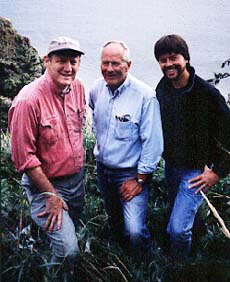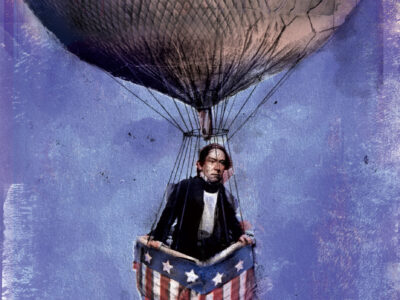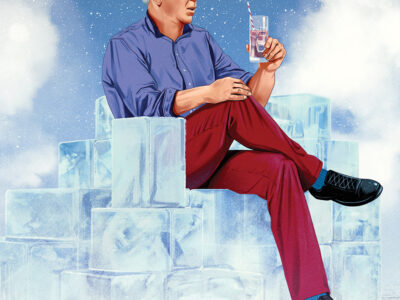
Fleshing Out the Characters of Lewis & Clark.
”History is not just a bunch of facts and figures and names and dates. It is a story that is best told and remembered [by putting] you as the reader or viewer into the moment history was being made,” says Dayton Duncan, C’71. “We are in the midst of history and we just don’t know what tomorrow will bring. People back in history also didn’t know that. They had to make choices just as we make choices, and they made mistakes just as we make mistakes.”
Duncan has put those ideas into practice as a writer and consultant on several acclaimed Ken Burns documentaries. Their latest project, scheduled to air on PBS this month, is Lewis & Clark: The Journey of the Corps of Discovery.
The four-hour documentary, which Duncan wrote and co-produced, recreates the journey west of Meriwether Lewis and William Clark through stories about the remarkable friendship that developed between these two unlike explorers; their quirks and their inner demons; the diverse tribes of Native Americans who befriended the expedition party; and the strange, beautiful, and often treacherous land over which they traveled — a land that would be forever changed by the millions of Americans who came after them.
Alumni should be especially interested in the “crash courses” that Lewis took from four Penn scientists before beginning his trek — including instruction from Dr. Benjamin Rush on the latest bloodletting techniques.
Duncan, who majored in German literature at Penn, is the author of six books, including four about the Lewis & Clark expedition. He has also worked as a newspaper reporter, columnist, and editor; chief of staff to former New Hampshire Governor Hugh Gallen; national deputy press secretary for Walter Mondale in his 1984 presidential campaign; and press secretary to Michael Dukakis in the 1988 presidential campaign.
But his favorite vocation is clearly “telling the story of American history.” He has known Burns, another New Hampshire dweller with the same passion for history, for 17 years, and served as a consultant on The Civil War, Baseball, and Thomas Jefferson. He was co-writer and consulting producer of Burns’ The West.
One similarity of each of these productions, as well as Lewis & Clark, is the close attention paid to the characters — warts and all — of the history makers.
“You couldn’t ask for a better character than Meriwether Lewis,” Duncan says. “He was a brilliant man and a great leader who seems to have probably drunk too much and later in life became addicted to opium, and was subject to what his mentor, Thomas Jefferson, called ‘occasional depressions of the mind.’ He could fall into times when it was a great effort just to do anything.” This is evidenced Duncan says, by long writing lapses in the journal Jefferson had instructed him to keep.
“Clark was much more gregarious, a little more levelheaded,” but a bit embarrassed about his lack of formal education. Even in the context of the times, his spelling “is a particular hoot to read,” Duncan says, noting that he spelled “mosquito” 19 different ways in his journal.
Burns and Duncan had the advantage of a terrific story to tell, but lacked the usual visual aids, such as photographs. So their film crew searched for spots along the trail that are still unspoiled by the sight of a power line or highway, and they relied on reenactment groups, filmed in silhouette, to set some scenes.
The lack of photos actually turned out to be a great strength, Duncan says. “Instead of looking at them, we become their eyes. We are with them when it’s snowing in the Bitter Root Mountains and they’re starving. You don’t see them starving, but I think you feel them starving and feel their fear every time they look up and see more mountains ahead of them.
“We discover, just as they did, just how big the Great Plains are, how magnificent a buffalo herd can be, how daunting the Rocky Mountains off in the distance can appear. What we learn is that probably the true star of the film is not Meriwether Lewis or William Clark … but the land itself.”
Lewis & Clark was scheduled to air November 4 & 5. A companion volume, Lewis & Clark: The Journey of the Corps of Discovery. An Illustrated History, has been published by Alfred A. Knopf and sells for $40. Videotapes of the documentary, distributed by PBS Home Video, sell for $29.98 and can be purchased at retail stores or by calling 1-800-424-7963.




